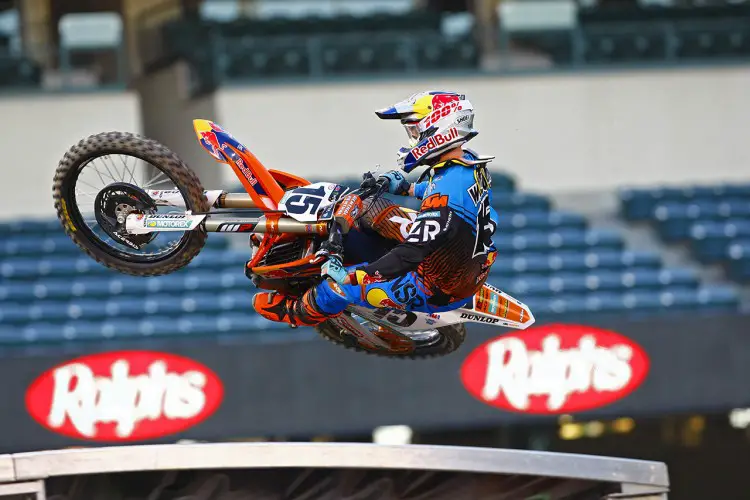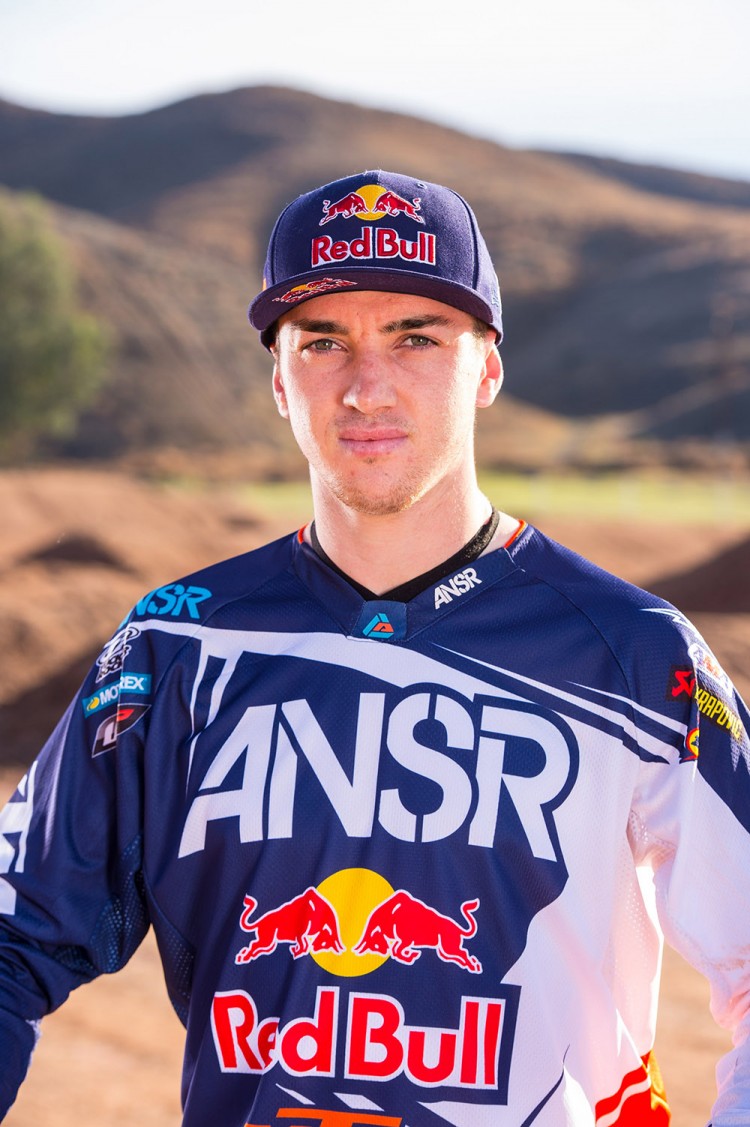INTERVIEW OF THE WEEK: DEAN WILSON
Red Bull KTM’s Dean Wilson has suffered a string of misfortune. The 2011 AMA 250 National Champion was at the top of the world a few years ago as Pro Circuit Kawasaki’s hot shot. Then Wilson blew out his shoulder while battling Eli Tomac for the 250 West Supercross title in 2012, and so began a string of injuries that would have any sane rider to question whether racing was the right career choice. Dean Wilson will be the first to admit that he second-guessed himself, especially after he blew out his knee early in this year’s 450 Supercross campaign. However, “Deano” endured. He’s healthy and ready to roll into next year healthy and, just like KTM’s motto, ready to race.
This is a side of Dean Wilson that you might not have seen before. Enjoy his candid responses, captured by Jim Kimball.
 Dean Wilson was only able to race three Supercross rounds before he blew out his knee. His best finish came at Anaheim 2, when he scored eighth.
Dean Wilson was only able to race three Supercross rounds before he blew out his knee. His best finish came at Anaheim 2, when he scored eighth.
Dean, when did you first learn to ride? I was born in Scotland. My parents bought me a four-wheeler when I was three years old, and the following year I got a 50cc dirt bike for Christmas. That’s when it all started. I began racing when I was seven. We moved to Canada shortly after that, which had nothing to do with my racing. At that time I was racing for fun. My dad owned a kitchen and cabinet business. My parents had been in Canada previously, and it seemed like a good move for the whole family.
At what point did your race results improve? It really helped that we started coming down to California in the winters to ride, because the weather wasn’t good in Canada. It was a big thing to be able to come to California, because I was basically able to ride year round. I kept improving and getting faster, which turned into a Team Green ride. Later I was able to get a ride with Pro Circuit. It was great, because I was actually getting paid to race while also being on the best 250 team. Mitch Payton and the rest of the team treated me great, and it was definitely a very special time for me. I had five really good years with Mitch.
What do you attribute to your success as a rookie? It all stemmed from being healthy and having confidence. I was getting good starts, so I learned the pace up front and managed to lead some laps. It was a great experience, and I grew from it as a racer. The mental side of racing is a big part in having success, and I had a lot of confidence as a rookie. I finished on the podium a few times in Supercross, and that confidence carried into the Nationals. I got a podium finish in my second outdoor race and then won the next National. At that time I had no pressure. Nobody really expected anything from me. All that success I had in my rookie year prepared me for a title fight the following year.
“PEOPLE EXPECT A WINNING RACER TO KEEP ON WINNING. THEY DON’T QUITE UNDERSTAND THE CHALLENGE OF BACKING UP A WIN. I DISCOVERED THAT DEFENDING A TITLE IS MUCH HARDER THAN WINNING A CHAMPIONSHIP FOR THE FIRST TIME. AFTER I WON THE 250 OUTDOOR TITLE IN 2011 I WAS EXPECTED TO DO IT AGAIN.”
Did the pressure eventually get to you? Yes. My rookie results put me in the spotlight, and I was expected to do even better in my second year. People expect a winning racer to keep on winning. They don’t quite understand the challenge of backing up a win. I discovered that defending a title is much harder than winning a championship for the first time. After I won the 250 outdoor title in 2011 I was expected to do it again.
You must be referencing your 2012 season. That was a pretty bad year for me. I was battling for the 250 West Supercross title with Eli Tomac and injured my shoulder. I tried to come back for the outdoors to defend my championship, but I just wasn’t healthy enough. My shoulder popped put of place at the Hangtown opener. I then got shoulder surgery, so my year was over. I really wanted to move up to the 450 class, so I signed with Jeff Ward Racing for 2013. Unfortunately I got a raw deal when the team folded. Thankfully Mitch Payton took me back. I raced the 250 East Supercross series in 2013 and won the first race in Dallas. I desperately wanted to win the Supercross title. Then I crashed and suffered a separated shoulder and broken ribs. That was another year when the Supercross title slipped away. I decided to race a 450 outdoors, but while practicing I suffered a mechanical failure and blew out my shoulder again. That was a tough one to swallow. Then, in 2014, I knew it would be my last chance to win a 250 Supercross title. The season started out a little tough, but by the end I started winning. I was pretty close in points, but I crashed while leading at San Diego, and that was it.
What’s it like riding for Mitch Payton? It was great being a part of his team, and I still have a great relationship with him. Mitch was always there whenever I needed help or wanted advice. Having Mitch in my corner has been really good for me. He has always believed in me, which means a lot. He’s just a really good guy. Even though I am on a different team, I’m very glad to have him in my corner.
Why did you sign with Jeff Ward Racing? I had other 450 offers, but I wanted to remain loyal to Kawasaki. After all, Kawasaki was there for me in the beginning of my career. I really liked the bike, and the people at Kawasaki treated me very well. I was also going to get a very good salary. Everything looked great on paper. Everyone kept warning us about the team, but we were confident that it was all going to be good. Then the next thing you know the team is closing its doors. I blew off two other really good deals to be on that team. It was a huge letdown.
Does the fact that you came up short in winning a 250 Supercross title weigh heavily on your mind? Not winning a 250 Supercross Championship is definitely something that bothers me. I was third in points during my rookie season when I got stuck in Canada for a few weeks, so my points got pretty screwed up. Then I was second the following two years. In my final year I was second in points when I crashed and then finished third. So, not winning a 250 Supercross title is very frustrating. I just was never able to pull it together. I try not to dwell on it, though.
 Wilson is entering his second year of a two-year deal with Red Bull KTM. It’s his make-or-break year.
Wilson is entering his second year of a two-year deal with Red Bull KTM. It’s his make-or-break year.
How do you deal with the ups and downs of racing? There were some pretty difficult times, especially the past few years. Generally after an injury I was always motivated to come back and do better. However, I was hurt so often that it took a toll on me. After I blew out my knee at the beginning of the 2015 Supercross series I wasn’t sure whether I should keep coming back. I didn’t want to get hurt anymore. Injuries are a part of the sport, but I’m sick of getting surgeries and being on the sidelines. Having to come back time and again from injury is tough, because I’m playing catch up. Injuries are the tough part about the sport, but I love racing. That’s why I keep doing it. I am very lucky to be able to make a living as a motocross racer.
Are your parents still actively involved in your racing career? My parents are still very supportive. They used to come to quite a bit of the races, but recently they have taken a step back. Now they come to the races that are most convenient for them. My dad has always been there for me. He was very vocal about what I was doing wrong or right, so at times he did stress me out, but we have overcome all that. He says it’s better for him to stay at home now [laughter].
“IT’S DEFINITELY EASY TO GET ATTRACTED TO THAT KIND OF LIFE WHEN YOU ARE LIVING IN SOUTHERN CALIFORNIA. THERE’S ALWAYS LOT OF STUFF GOING ON. OF COURSE I LIKE TO HAVE FUN NOW AND AGAIN, BUT AT THE SAME TIME I HAVE SEEN LOTS OF GUYS WHO GET CAUGHT UP IN DRUGS AND POOR DECISIONS. I STAY CLEAR OF ALL THAT. I KNOW THAT I HAVE TO WORK HARD IN RACING.”
As a young kid making a lot of money, how did you avoid getting caught up in the party lifestyle? I believe that’s due to my upbringing. I really had to work hard to get to where I am. It’s definitely easy to get attracted to that kind of life when you are living in Southern California. There’s always lots of stuff going on. Of course I like to have fun now and again, but at the same time I have seen lots of guys who get caught up in drugs and poor decisions. I stay clear of all that. I know that I have to work hard in racing. Sure, I like to have fun with my friends now and again, but I have stayed levelheaded. I learned that from my parents. They sort me out in a heartbeat if I stray or go off the path.
How did the Red Bull KTM deal come together? I signed with KTM at the Las Vegas Supercross in 2014. It was a very exciting time for me, as I was finally going to the 450 class with a proven team. Roger DeCoster had already asked me to join the team once prior–at a Starbucks in California. I had declined the ride, which wasn’t very easy for me to do. I wasn’t going to tell him no again. I must say that this is a very, very good place for me to be. It’s a very professional team. I’m very happy with where I am at right now. KTM, as a global company, is pushing forward. In Europe, as well as the U.S., they are doing everything they can to be the leader. Their bikes are really the best ones out there. They will do whatever they can to get their bikes and their athletes better. It’s a pretty exciting time.
Can you take away any positives from your knee injury? The first week after I blew my knee out at the start of the 2015 season was very tough. Then I got over it and moved on. When you blow your knee out it’s a six-month deal, so I just tried to make the best of it. I went to Australia for a little while to visit a friend and kept up on my knee therapy. It was cool because I had always wanted to go to Australia. I also did a few riding schools, which I really enjoyed. Then I went to Canada to visit some family. Finally, I went to Scotland to visit some more family and also did a riding school out there. Then I went to Belgium to get my carpel tunnel in my arms corrected. During that time off I took the opportunity to have a few lingering injuries fixed. I got surgery on my knees and arms. People think I had arm pump surgery, but it wasn’t that at all. I had a carpel tunnel issue and it needed to be done.
Why did you race the last few Nationals? I needed the seat time. I could have stayed off all year and come back at Monster Cup, but I wanted to get back racing and build up my confidence by getting decent results. I wanted to prove it to myself. When you are injured and sidelined for that long of a time it’s an uphill battle. Once you finally get there though, it makes it all that much sweeter.





Comments are closed.